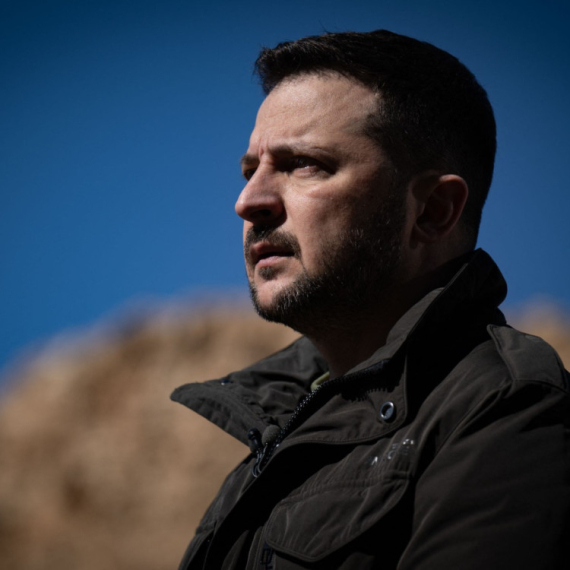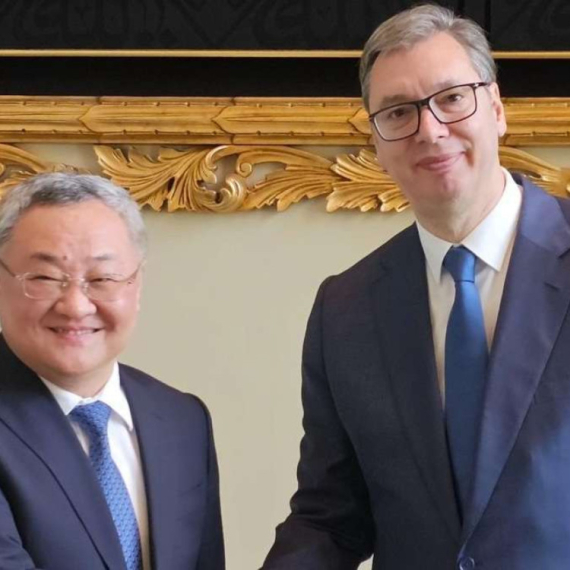"Unity over Kosovo took West by surprise"
President Tadić and Prime Minister Koštunica's united front has surprised the international community, an analyst says.
Tuesday, 21.08.2007.
13:10

President Tadic and Prime Minister Kostunica's united front has surprised the international community, an analyst says. In the opinion of a British professor and Balkan expert, Mark Almond, no solution to the Kosovo issue, other than one based on an unlikely agreement between Belgrade and Pristina, can fully satisfy the expectations of NATO and the West, the BBC reported. "Unity over Kosovo took West by surprise" "The problem for the international community, and particularly for NATO, is that it is impossible to imagine a truly independent Kosovo from which it can withdraw, and which won’t require the presence of international forces." "Linked to that is the issue of how that Kosovo that we will have to support and protect will look , which is a hard enough job as it is without Serbia and Russia who haven’t been cooperating,” said Almond The professor, who teaches modern history at Oriel College at Oxford University, feels there are several potential solutions to the Kosovo problem, including a so-called great agreement between the U.S. and Russia on all unresolved separatist issues. He added that another would be maintaining the status quo, while a third would involve the West unilaterally recognizing an independent Kosovo, which would directly lead to a proclamation of independence by the north of Kosovo, thus complicating the position of the western countries even further. "Therefore, the current unsatisfactory situation is, in some way, at least from the West’s point of view, the least painful option. Whether the Serbs and the Kosovo Albanians feel the same way is another matter," reflected Almond. At the same time, he stressed that the unity demonstrated by President Tadic and Prime Minister Kostunica, as well as the overall political scene in Serbia has taken the U.S. and Europe by surprise. The professor went on to say that, "Whatever the aims of the Serbian Government have been, if there is a difference of opinion between the prime minister and the president, or between the parties of the ruling coalition, that’s going to weaken their negotiating position.” “I must say that the Americans and Europeans have been surprised by Kostunica and Tadic’s united front, not to mention the overall Serbian political scene vis-à-vis Kosovo. That unity, allied with the threat of a Russian or Chinese veto, has led to the current round of talks and, at the very least, the delay of what NATO and the EU had been expecting,” he added. The BBC added that government officials, belonging to the Democratic Party of Serbia (DSS) have for the last three weeks been calling on the United States to give up trying to create a NATO state in Kosovo, and to officially abandon the plan drawn up by Special UN Envoy Marti Ahtisaari. "The call for a return of Serbian troops and police to the province has simply strengthened the anti-NATO campaign, the consequences of which, according to some observers, could soon become evident and potentially far-reaching both domestically and internationally," says the BBC. ICG warns of fresh ethnic conflicts An international think tank said Tuesday that the European Union should support independence for Kosovo or risk plunging the region into violence. “New talks between ethnic Albanians and Serbia are likely to fail,” the International Crisis Group, a Brussels-based think tank, said in a report, adding that the EU's failure to form a common position on Kosovo's independence would have "very disturbing consequences for Europe." "If it is incapable once again, it would almost certainly lead to bloodshed and renewed regional chaos that would blow back into Central and Western Europe in the form of refugees and stronger organized crime networks," said Sabine Freizer of ICG. The report, titled "Breaking the Kosovo Stalemate: Europe's Responsibility," called upon the bloc to coordinate a unilateral declaration of independence by Kosovo's ethnic Albanian leaders if talks between the two sides, slated to end by Dec. 10, do not result in an agreement. However, it urged Western diplomats to "restrain Kosovo Albanians from unilateral actions," fearing an unsupervised declaration of independence could prompt leaders in Kosovo's Serb-dominated north to respond with a separatist move of their own. The 37-page report of the International Crisis Group urged the EU and U.S. to enforce the Ahtisaari plan, despite Russia's opposition to Kosovo's independence. "If Kosovo explodes because the independence issue is mishandled, the regional risks would include that eight years worth of international resources and prestige dedicated to managing the crisis would be lost," the report said. "The genie of ethnic conflict would be let loose again."
"Unity over Kosovo took West by surprise"
"The problem for the international community, and particularly for NATO, is that it is impossible to imagine a truly independent Kosovo from which it can withdraw, and which won’t require the presence of international forces.""Linked to that is the issue of how that Kosovo that we will have to support and protect will look , which is a hard enough job as it is without Serbia and Russia who haven’t been cooperating,” said Almond
The professor, who teaches modern history at Oriel College at Oxford University, feels there are several potential solutions to the Kosovo problem, including a so-called great agreement between the U.S. and Russia on all unresolved separatist issues.
He added that another would be maintaining the status quo, while a third would involve the West unilaterally recognizing an independent Kosovo, which would directly lead to a proclamation of independence by the north of Kosovo, thus complicating the position of the western countries even further.
"Therefore, the current unsatisfactory situation is, in some way, at least from the West’s point of view, the least painful option. Whether the Serbs and the Kosovo Albanians feel the same way is another matter," reflected Almond.
At the same time, he stressed that the unity demonstrated by President Tadić and Prime Minister Koštunica, as well as the overall political scene in Serbia has taken the U.S. and Europe by surprise.
The professor went on to say that, "Whatever the aims of the Serbian Government have been, if there is a difference of opinion between the prime minister and the president, or between the parties of the ruling coalition, that’s going to weaken their negotiating position.”
“I must say that the Americans and Europeans have been surprised by Koštunica and Tadić’s united front, not to mention the overall Serbian political scene vis-à-vis Kosovo. That unity, allied with the threat of a Russian or Chinese veto, has led to the current round of talks and, at the very least, the delay of what NATO and the EU had been expecting,” he added.
The BBC added that government officials, belonging to the Democratic Party of Serbia (DSS) have for the last three weeks been calling on the United States to give up trying to create a NATO state in Kosovo, and to officially abandon the plan drawn up by Special UN Envoy Marti Ahtisaari.
"The call for a return of Serbian troops and police to the province has simply strengthened the anti-NATO campaign, the consequences of which, according to some observers, could soon become evident and potentially far-reaching both domestically and internationally," says the BBC.
ICG warns of fresh ethnic conflicts
An international think tank said Tuesday that the European Union should support independence for Kosovo or risk plunging the region into violence.“New talks between ethnic Albanians and Serbia are likely to fail,” the International Crisis Group, a Brussels-based think tank, said in a report, adding that the EU's failure to form a common position on Kosovo's independence would have "very disturbing consequences for Europe."
"If it is incapable once again, it would almost certainly lead to bloodshed and renewed regional chaos that would blow back into Central and Western Europe in the form of refugees and stronger organized crime networks," said Sabine Freizer of ICG.
The report, titled "Breaking the Kosovo Stalemate: Europe's Responsibility," called upon the bloc to coordinate a unilateral declaration of independence by Kosovo's ethnic Albanian leaders if talks between the two sides, slated to end by Dec. 10, do not result in an agreement.
However, it urged Western diplomats to "restrain Kosovo Albanians from unilateral actions," fearing an unsupervised declaration of independence could prompt leaders in Kosovo's Serb-dominated north to respond with a separatist move of their own.
The 37-page report of the International Crisis Group urged the EU and U.S. to enforce the Ahtisaari plan, despite Russia's opposition to Kosovo's independence.
"If Kosovo explodes because the independence issue is mishandled, the regional risks would include that eight years worth of international resources and prestige dedicated to managing the crisis would be lost," the report said.
"The genie of ethnic conflict would be let loose again."



























































Komentari 23
Pogledaj komentare